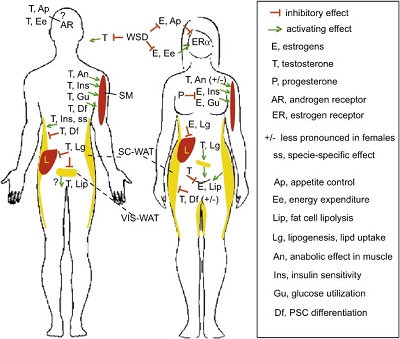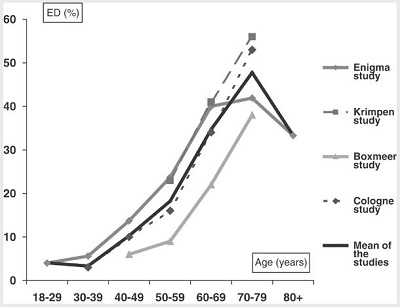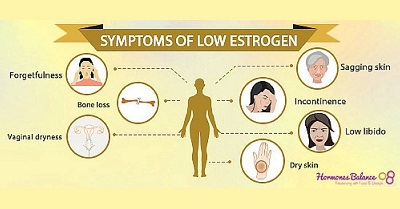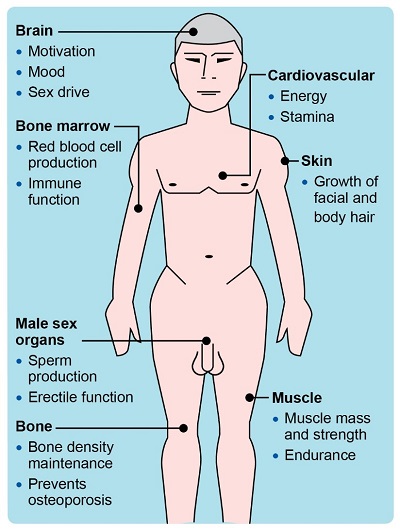Millions of men and women across the United States struggle with low libido. With the fast-paced on-the-go lifestyle of the modern world, chronic stress, poor eating habits, and wrecked hormonal health, it comes as no surprise to public health experts that the sexual health of Americans has declined in recent decades.
A healthy desire for sex is essential for maintaining strong intimate relationships with romantic partners and for the living the richest, most fulfilling life possible. Clinically, low libido is often known as hypoactive sexual desire disorder (HSDD).
If you’ve been impacted by impaired libido, you can restore your sex drive (and rekindle the magic in your love life) with the right set of lifestyle adjustments.
How Common Is Low Libido in 2021?

As with other markers of poor hormone health, low libido is increasingly common in the West. Low sex drive affects both sexes roughly equally. One study of US adult women ages 30-70 published in the Archives of Internal Medicine found that “prevalence of low sexual desire ranged from 26.7% among premenopausal women to 52.4% among naturally menopausal women.”
Low libido affects similar percentages of men; clinical reporting in one study found that about one-third of men over 50 years of age show the symptoms of impaired sexual health. The startling statistical surveys of Americans of all ages show dramatic upticks in the instances of low libido – even among young people.
Less and less Americans are engaging in regular sex. While this downward trend likely has many causes, lower interest in sex among the general population is clearly one of the factors at play. Low libido threatens relationships and drives down the quality of life of affected individuals as well as that of their partners. Correcting the issue to achieve a restored sex drive, however, is possible. Here’s how to get started.
How Do Doctors Diagnose Low Sex Drive?
To diagnose low libido, a healthcare provider must take a look at the whole picture: the patient’s physical health, mental health, and lifestyle. For men, the health markers that doctors use to diagnose low sex drive include:
- Cardiovascular disease.
- Smoking and/or alcohol habits.
- A review of current medications, if any.
- Physical exam.
- Review of medical history.
- Hormone testing.*
Most cases of low libido (those not caused by psychological conditions) can be traced back to poor hormone health. This is especially true for older patients. Hormonal issues negatively impact libido similarly in men and women. The chart below shows the typical downward trajectory of estrogen and testosterone — the main sex hormones for men and women, respectively – across the lifespan.
Later, we will explore potential therapeutic remedies for falling estrogen and testosterone levels with hormone replacement therapy (HRT).
Questions That Your Doctor Might Ask About Your Sexual Health
Due to the many factors that can contribute to low libido, you can expect some combination of the following questions during your doctor’s visit in addition to a physical exam:
- Have you previously been diagnosed with low libido?
- Do you have a regular sexual partner?
- Are you in a committed relationship?
- How often do you have sex?
- Are you a smoker?
- Do you drink or use recreational drugs? How often?
- Do you have a history of mental health issues?
- Do you regularly exercise? How often?
- What foods do you typically eat?
- Are you currently taking any medications or supplements?
- Do you consume pornography?
- How long have you struggled with sexual desire?
- Have you attempted to correct low libido on your own in the past?
- How has low sex drive impacted your quality of life?
Psychological Causes and Symptoms of Low Libido in Men and Women
 Although the phrase “it’s all in your head” can be frustrating to hear when confronted with a real problem like impaired sex drive, sometimes psychological factors can, in fact, cause low libido in both men and women. Low libido can manifest psychologically in a few key ways, most notably in relationship Issues. Intimate partners struggling with low libido are more likely to engage in disputes, sometimes putting the relationship in jeopardy moving forward.
Although the phrase “it’s all in your head” can be frustrating to hear when confronted with a real problem like impaired sex drive, sometimes psychological factors can, in fact, cause low libido in both men and women. Low libido can manifest psychologically in a few key ways, most notably in relationship Issues. Intimate partners struggling with low libido are more likely to engage in disputes, sometimes putting the relationship in jeopardy moving forward.
If you and/or your partner are otherwise healthy but struggle with less intense sexual desire than you previously enjoyed, it’s possible that psychological factors such as untreated depression or stress are the primary culprits.
Psychological Causes of Low Libido
Here are the most common psychological causes of low libido in men and women:
- Depression.
- Anxiety disorders.
- Mood disorders.
- Chronic stress (from work, family, social commitments, etc.).
- Emotional trauma or abuse.
- Poor self-esteem or body image.
Psychological Symptoms of Low Libido
Low libido can take a toll on the psyche, often manifesting in one or more of the following ways:
- Frustration.
- Feeling inadequate.
- Disconnection/isolation from your partner.
- Worsening depression or anxiety.
- Emotional withdrawal from intimacy.
How to Boost Sex Drive in Low Libido With Psychological Causes
If you’ve experienced psychologically-induced low libido, here are a few ways to naturally restore your sex drive:
- Practice relaxation techniques. Stress is arguably the #1 driver of low libido in the modern world. Before reaching for the pill bottle, consider the science-backed benefits of meditation, breathing exercises, and yoga. Therapists report enormous success in their patients with low libido in terms of improved sexual health when they practice relaxation techniques daily.
- Stop watching porn. Recent research has examined the role that viewing pornography might play in diminished sexual libido. A 2015 Canadian study showed that, among men who watched more than 7 hours of porn per week, 71% had low libido.
- Sex counseling. A sub-set of therapists specialize in providing counseling with the aim of improving sexual health, including upping libido.
- Shake up your sex life. If you and your partner are “in a rut” in your sex life, consider “spicing” it up with experimentation (foreplay, sex toys, fantasy role-playing, etc.).
Physical Causes and Symptoms of Low Libido in Men and Women
More often than not, low libido in men and women is caused by an interplay of psychological and physical factors. Here, we’ll discuss the physical causes, symptoms, and treatments for low libido when the underlying issue is either fully or partly physical.
Physical Causes of Low Libido in Women
Poor physical health can translate into low libido. Here are some physical conditions that can lower sexual desire in women:
- Cardiovascular disease.
- Smoking and/or excessive alcohol use.
- Diabetes.
- High blood pressure.
- Arthritis or other autoimmune conditions.
- Physical exhaustion.
- Certain medications (including anti-anxiety and antidepressant drugs).
- Recent surgery.
- Shifting hormone levels.*
*As women move into the menopause period, usually in their mid-40s, falling estrogen levels cause significant drop-offs in interest in sex.
Physical Symptoms of Low Libido in Women

Low libido doesn’t cause physical symptoms itself per se, but the same hormonal deficits (usually experienced by women in menopause) that trigger low libido can also cause other physical symptoms such as:
- Night sweats.
- Hot flashes.
- Vaginal dryness.
- Sleep problems.
- Irregular periods.
Physical Causes of Low Libido in Men
Many (not all) of the same physical (mostly lifestyle-related) factors that cause low libido in women also cause the condition in men. Accordingly, please refer to the previous section for a comprehensive list of physical causes of low libido in men. However, men have one physical consideration in terms of libido that is by far the most critical for restoring and maintaining sex drive: testosterone.
For men, low libido is directly tied to circulating testosterone levels. Testosterone is the primary male sex hormone that supercharges male sexual vitality. Testosterone supports men’s sexual health in the following ways:
- Facilitates and maintains erections.
- Supports production of healthy sperm.
- Increases sex drive.*
The devastating reality for many men is that testosterone levels tend to decline by an average of 1% per year of life. Over time, this reduction in testosterone adds up, leaving men vulnerable to a number of undesired and unhealthy symptoms of low testosterone, including low libido. Testosterone levels in older men are often half those of younger men. These deficiencies result in less intense sexual desire and poorer performance in the bedroom.
Physical Symptoms of Low Libido in Men

Although these symptoms do not confirm a low libido diagnosis per se, they do indicate poor hormone health that often goes hand-in-hand with impaired libido:
- Tiredness.
- Disturbed sleep patterns.
- Loss of muscle mass and/or bone density.
- Weight gain.
- Lowered sperm count.
- Inability to maintain a hard erection.*
*Erectile dysfunction (ED) — the inability to achieve and maintain an erection — is closely linked to low libido in men. And, just like libido issues, the rates of ED increase as men age.
If you are a man over 40 experiencing an unwelcome drop-off in libido, chances are very high that you have a diagnosable testosterone deficiency. Read on to discover strategies to improve hormone health that reliably restore a healthier libido in men who practice them.
How to Increase Sex Drive in Low Libido With Physical Causes
For both men and women battling low libido due to physical causes, consider the following strategies to achieve the positive changes you want to see in the bedroom:
- Get more regular exercise. The human body evolved to be active every day. When we engage in physically demanding activities, all aspects of human physiology function better. Accordingly, the benefit of exercise for sexual health cannot be overemphasized; no matter what your age, getting in plenty of daily activity is essential for a healthy libido. Weightlifting is especially effective for men looking to boost their sex drive.
- Get a minimum of 7 hours of restful, restorative sleep every night.
- Incorporate more aphrodisiac foods such as chocolate, asparagus, and oysters into your eating plan.
- Supplement with herbs proven to boost libido such as red ginseng, omega-3 fatty acids, and maca root.
- Reduce or eliminate alcohol/recreational drug use.
- Review all medications that you currently take for reported side effects related to libido. If you are taking a medication known to reduce sex drive, consider re-titrating your dose or an alternative therapeutic altogether. Your doctor can help in this process.
- Hormone replacement therapy.
Hormone Replacement Therapy to Improve Libido
Hormone replacement therapy (HRT) is a rapidly evolving field of medicine with enormous healing potential for the millions of Americans who struggle with the devasting health effects of a dysfunctional hormone system.
The human endocrine system exerts vast influence over every aspect of health, including sex drive and reproductive health. Both men and women benefit from HRT in cases of diagnosed hormone deficiencies. Here is everything you need to know about the respective male and female sex hormones, their impacts on libido, and how to safely increase your levels.
HRT for Men
The therapeutic introduction of male sex hormones to men with low levels is called testosterone replacement therapy (TRT). Millions of men worldwide safely and effectively achieve elevated testosterone counts with TRT each year. In addition to enhancing libido, TRT offers an array of benefits for men. The chart below details them.
Although testosterone is most commonly associated with male sexual vitality, the hormone benefits health in the numerous ways above because testosterone receptors (called androgen receptors or ARs) are actually located throughout the body.
Specifically, in terms of libido, hundreds of clinical studies consistently show that increases in testosterone are directly tied to increases in libido in men.
HRT for Women
The therapeutic supplementation of hormones is just as restorative for women’s sexual health as it is for men. Estrogen replacement therapy (ERT) involves the careful substitution of lab-produced synthetic estrogen to replace falling levels of the female sex hormone normally produced by the ovaries.
ERT is especially popular among menopausal and postmenopausal women, who generally report the greatest improvements in several health markers, including a revived sex drive.
Emerging evidence also suggests that testosterone replacement therapy for women may benefit the aging female libido as well: “Testosterone at supraphysiological levels, but not at physiological levels, enhances the effectiveness of a low dose estrogen therapy at increasing sexual desire in postmenopausal women.”
Human Growth Hormone and Libido
In addition to testosterone, individuals with low levels of human growth hormone (HGH) may benefit from HGH replacement therapy. Researchers in recent investigations of the link between HGH and libido have shown that a “growing body of evidence supports the hypothesis that GH also modulates reproduction directly, exerting both gonadotropin-dependent and gonadotropin-independent actions in both males and females.”
In simple terms, this means that HGH acts both directly and indirectly through multiple signaling pathways to support sexual health in both men and women.
Best Lifestyle Changes to Maintain Optimal Sex Drive
 HRT is by no means the only strategy to keep your sexual health in prime condition. Once you’ve unlocked the massive health benefits of HRT, including enhanced libido, institute the following lifestyle adjustments to sustain your progress in the long run:
HRT is by no means the only strategy to keep your sexual health in prime condition. Once you’ve unlocked the massive health benefits of HRT, including enhanced libido, institute the following lifestyle adjustments to sustain your progress in the long run:
- Limit alcohol/recreational drug use.
- Stop smoking.
- Exercise daily (with a focus on weightlifting for men).
- Sleep longer hours.
- Limit stress with meditation, breathing exercises, or other relaxation techniques.
- Work on open communication with your partner. Communication is key in any relationship, whether the issue at hand is sex or family finances. If you need help facilitating open dialogue with your partner, consider enlisting the services of an experienced relationship therapist who can help.
The Bottom Line on Achieving a Healthy Libido for the Long Term
If you have struggled with a low sex drive, you don’t need to suffer any longer. Modern medicine has made enormous leaps in terms of understanding and treating low libido. In aging populations and increasingly for younger patients, HRT with testosterone for men (TRT) and estrogen for women (ERT) is the tip of the spear to safely and effectively restore libido for long-term gains.

